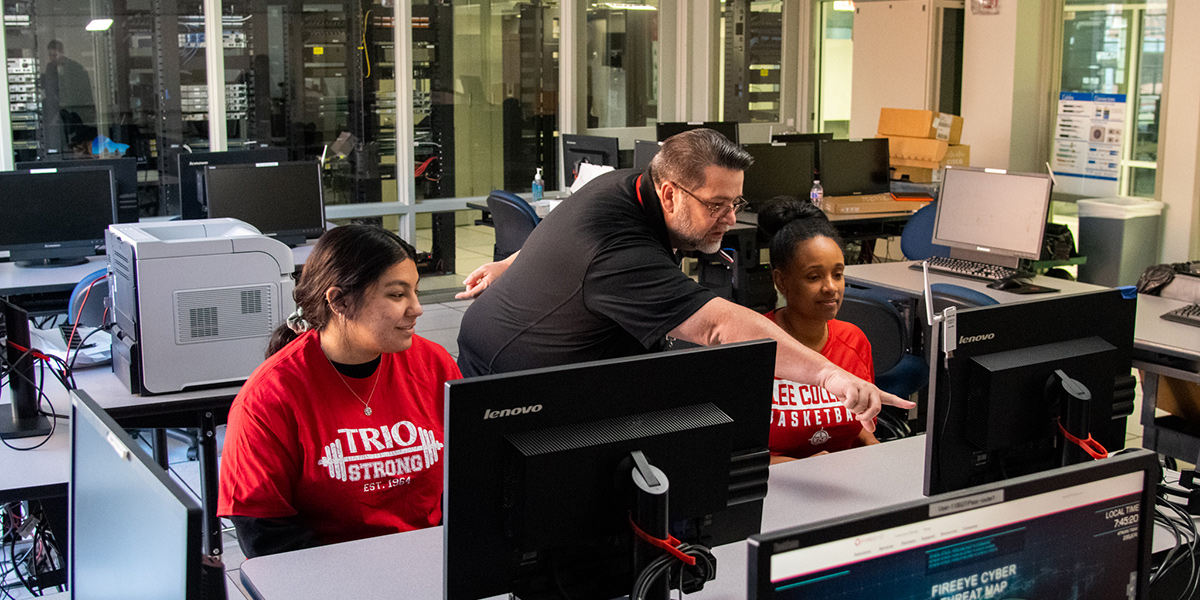Certificate and Associate Degree Programs Set to Begin Fall 2022
Lee College is meeting the growing demand for skilled IT (information technology) workers in cybersecurity and cloud computing by preparing to offer new degree and certificate programs this fall. Students will have the option to take these computer science courses in-person and online. Learn more about these programs.
"With the addition of these programs to our STEM pathway, the college is aligning instruction with the needs of the 21st Century workforce," said Dr. Lynda Villanueva, Lee College president. "Cutting-edge careers in cybersecurity and cloud computing provide our students opportunities in fields with family-sustaining wages."
Cybersecurity Associate in Applied Science (AAS) and Certificate Program
Students who want to pursue an Associate in Applied Science (AAS) degree or certificate in cybersecurity will learn about networking, computer maintenance, digital forensics, information security and cyber psychology in the face of emerging technology, to name a few.
"The goal for our graduates is to have the knowledge to start on the ground floor in a security operations center and work their way up to information security analyst," said William Walker, cybersecurity lead instructor in the Lee College Department of Computer Technology.
According to the United States Bureau of Labor Statistics, information security analyst jobs are projected to grow 31 percent by 2030 — much faster than the average for all occupations. In May 2020, during the peak of the COVID-19 pandemic, the median annual wage for this position was more than $103,000 a year. Industries that employ information security analysts include finance and insurance, computer systems design as well as administrative and support services.
One of the main responsibilities of an information security analyst is to monitor networks for security breaches and to stay up to date on the latest methods attackers are using to infiltrate computer systems. That involves developing security standards and best practices that are most effective in protecting their organization in the event of a disaster.
"Hackers aren't going to stop. They are going to continue and get even more savvy with their attacks," Walker explained. "We want people to be aware of what's out there and what they can be doing to protect themselves and others."
Cloud Computing Certificate Program
Another area of IT that has evolved quickly during COVID-19 and continues to grow is cloud computing. Starting this fall, Lee College plans to offer a certificate and eventually an associate degree in cloud computing, which is the delivery of different services through the Internet, including data storage, servers, databases, networking software and analytics. Cloud-based storage and collection of big data make it possible to save files to a remote database and retrieve them on demand.
Students who take this course will learn how to create a cloud system from beginning to end, which will include IP address scheming and user control systems. Once they get certified as a "Level 2 Cloud Practitioner," students can have their pick of careers as cloud engineers, cloud architects or cloud consultants for various industries.
"The number of positions that need to be filled right now is astronomical and steadily increasing," said Steven Saunders, instructor in the Lee College Department of Computer Technology. "Students should be able to get employment almost immediately with a certification."
Some of the most recognizable companies that use and offer cloud computing services are Amazon, Apple, Google and Microsoft. According to experts, the cloud computing market is positioned to be worth $947 billion by 2026.
Both Saunders and Walker say the pandemic made people realize that working in a virtual system just makes more sense. They imagine some of the students who will take their courses are those who've worked in careers that have changed with technology.
"These are the individuals who need to get back into the workforce and earn money right away. A certificate will allow them to do that." Saunders explained. "It's also possible they will continue their education and go for a degree while they are in their new employment."
Learn more about the cybersecurity and cloud computing programs or enroll in the courses.

